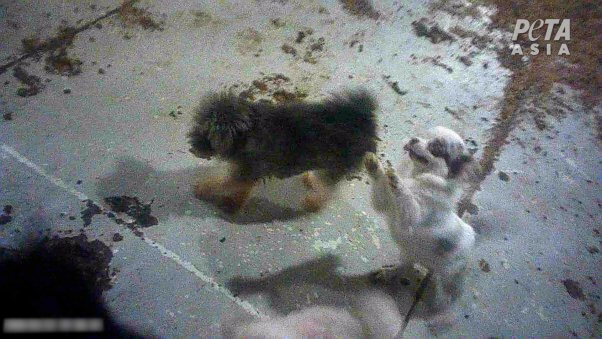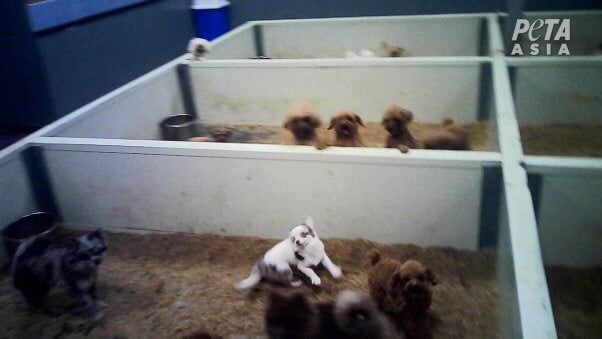Here’s How This Terrified Blind Dog Escaped and Found a New Life
When an undercover PETA Asia investigator first saw a small, scared, blind dog in a noisy pen at a self-professed “humane breeder” in South Korea, she was spinning in endless circles—possibly in an attempt to cope with her appalling conditions. The breeder had planned to sell the little dog, later named Paalang, before discovering that she appeared to be blind. PETA Asia’s undercover investigator knew that Paalang couldn’t be left in such a hellish place and searched for a way to rescue her. Because a blind dog is generally deemed unsalable, the investigator was able to persuade the breeder to surrender her.


How Breeders Hurt Dogs Like Paalang
Whenever animals are treated like merchandise to be bought and sold, they suffer.
Humans crossbreed and inbreed dogs to produce puppies with certain physical attributes that they hope will be in demand so they can make money off them. Crossbreeding typically involves breeding two purebreds of different breeds or two varieties of the same breed to get the desired characteristics. While Paalang’s endless spinning was likely a coping mechanism to deal with her surroundings, it may also have been a result of her dramatically rounded head. Referred to as an “apple-head,” its shape is a result of intentional genetic manipulation. Because the skull isn’t suitably shaped for the brain inside it, this unnatural trait can lead to serious neurological issues.
Paalang’s coat color is referred to as “double merle,” which results from the breeding of two dogs with the “merle” color gene mutation. The resulting coat color can also be accompanied by deafness and vision problems, and because of these inherent risks, “double merle” animals are rare and can be sold for a higher price. The breeder likely knew this and decided that the prospect of a hefty profit outweighed the risk of ending up with an unsalable blind dog.
Paalang’s Road to Recovery
After rescuing Paalang, the investigator rushed her to a veterinarian, where it was confirmed that she was unable to see. She was also partially deaf, likely a result of the “double merle” gene. She also had to be treated for ear mites. But despite everything that she has been through, this sweet dog loves receiving her rescuer’s affection—likely the only kindness she has ever experienced.
In her new healthy, loving environment, Paalang’s circling behavior diminished, as did her fear of the outdoors. She is now learning how to go for walks and is even discovering how to play. Her rescuer chose her name because “paalang” is a Korean word that refers to the soft fluttering of a butterfly’s wings. Like a caterpillar who transforms into a butterfly, Paalang was once limited within her surroundings but has now spread her wings and is learning how to explore, trust, and love, thanks to her new adoptive family.
Whether dogs are seen in a pet store window or in a photo on a breeder’s website, they pay an intolerably high price for the pet industry’s greed. You can help dogs like Paalang by never buying a dog from a breeder, a pet store, Craigslist, or anywhere else. Millions of homeless animals are in shelters all around the world, and when you buy a dog, you rob one of these deserving animals of a chance at finding a loving family. If you are ready for the lifelong emotional and financial commitment of adding an animal companion to your home, find your new family member at a local shelter.

